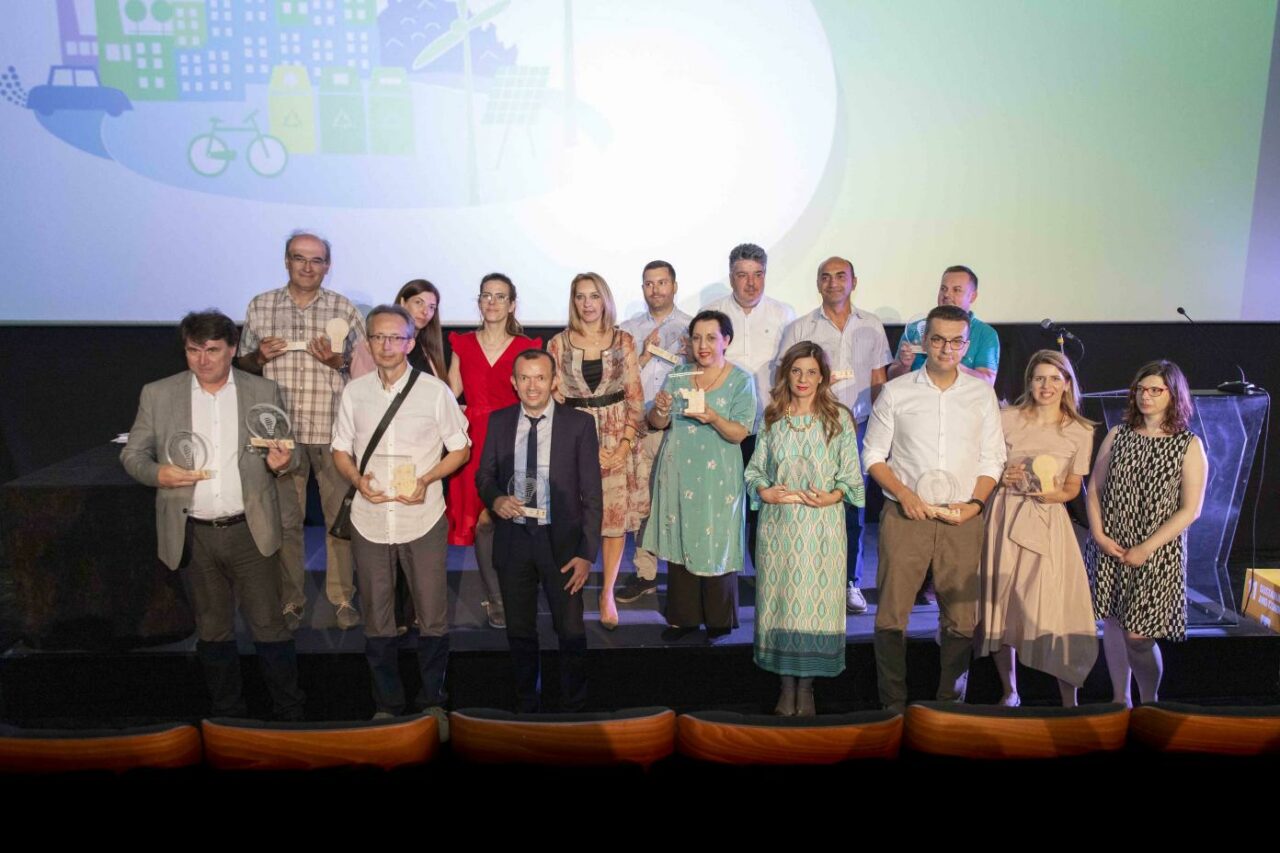-
Aug 15 2022 Bio soap production creates jobs for women and helps preserve the environment
Sjenica, a town in Western Serbia, is surrounded by nature reserves on all four sides. One of these nature reserves is the Uvac Special Nature Reserve – home to the largest griffon vulture colony, a protected bird species nesting in this region. Being an area favourable to animal husbandry, sheep in particular, Sjenica is also famous for its eponymous cheese, as well as other specialities such as sujuk (a type of spicy sausage) and mantije (stuffed filo pastry), but also for its hospitality. Because of its unique natural beauty and its authentic local cuisine, the Sjenica region is attracting many tourists. This is why a number of locals have turned to tourism as their source of income in this, still underdeveloped, municipality.
Among them is Edina Puljić, an entrepreneur. Having spent years working in Western Europe she and her family returned to Sjenica and set up an ethno household.
– All our guests are presented with an authentic souvenir – bio soap. To remember us by and to come back and stay with us again. I make this soap using leftover cooking oil – Edina says.
Edina’s household is one of around 500 households in the region of Sjenica, from a total of over 2.000 households around Serbia, that are a part of BIO IDEA for Sustainable Development association’s social franchise. This association focuses mainly on women of different ages to teach them how to make home-made soap using leftover cooking oil from their households to generate additional income and save money. This opportunity is particularly interesting to women living in Sjenica, where the poverty risk index stands at 46.6%. At the same time, these workshops bring together women from different ethnic groups as this is an ethnically diverse area, with Bosniaks, Serbs, Albanians, Montenegrins, Turks, Roma and members of other communities living side by side.
Sanida Klarić, founder of BIO IDEA for Sustainable Development, says that the soap making workshops are primarily intended for women from difficult-to-employ categories such as women living in remote rural areas or women living in towns who became unemployed and are over the age of 45.
– Households in Serbia consume around 2,300 tonnes of cooking oil every month, of which one third ends up in nature. We recognised an opportunity to use the leftover cooking oil as a raw material for home-made soap production in social entrepreneurship workshops for women around the country – says Sanida.
Workshops are held in village households which traditionally make dairy products, handicrafts and fruit- and vegetable preserves, so manufacture and sale of bio soap can represent an additional activity for them. Training is free and the only condition for joining a workshop is solidarity to pass on the skills they have acquired to others.
In addition to contributing to economic empowerment of women, the manufacture of bio soap is also beneficial for the environment of the Sjenica region by reducing the quantity of waste ending up in its landfills. The Municipality of Sjenica has also recognised the importance of this initiative and has decided to support its further development by forming a soap manufacture cooperative.
BIO IDEA has reached other parts of Serbia as well. An entrepreneur from Zemun, Nataša Dokić, makes bio soap in her own home. Her main motivation is to protect the environment.
– I looked for ways of making my own contribution, in addition to recycling glass, paper and other types of waste, and making a difference, in my own home at least. That was when I discovered these leftover cooking oil recycling workshops. My family and I use the soap I make for any cleaning that needs to be done around the house – says Nataša.
In addition to good will and a bit of learning, if you want to make soap you also need proper equipment. The equipment was patented by BIO IDEA with the help of their partners – The Institute of General and Physical Chemistry and Ekoera company. The equipment consists of two recipient containers made from recycled materials, connected with a mesh for the oil to go through. It uses zeolite as filter to retain water and other impurities and obtain purified oil. Sodium hydroxide is then added to the purified oil which kick starts the process of saponification. Coffee, orange peel or dried herbs can be added to the mixture to enhance the soap fragrance. And 24 days later, the soap is ready to be used.
The advantage of bio soaps when used on skin is that they contain no allergens or preservatives. They are also good for the environment because they are biodegradable and their use does not impact the environment nor does their manufacture emit any noxious gases. For example, one litre of used cooking oil is enough to produce 10 bars of soap. This also saves 3.8 kilograms of Carbon dioxide (CO2) emissions if they were to be produced industrially. For example, that is the amount of CO2 emitted by a brand new car travelling from Belgrade to Pančevo and back.
– It benefits both man and nature if we use natural instead of industrial soap, whose production and distribution requires oil derivatives. Our tradition teaches us not to throw anything away. People have been making their own soap for centuries – says Sanida Klarić, while getting ready the next shipment of bio soap from her workshop in Belgrade.
This type of soap production promotes circular economy approach to entrepreneurship as well as in our own households. By reusing leftover cooking oil as raw material for a new product, we reduce waste that would normally end up in waste water systems or in landfills and further pollute the environment.
Check out a video story on this valuable initiative HERE.
***
“Accelerating Circular Economy” project was selected as one of the six best solutions under the “Bio-waste Management Challenge Call” organised by the United Nations Development Programme (UNDP) and the Ministry of Environmental Protection, with the support of the Swedish International Development Cooperation Agency (SIDA). The goal of this challenge was to support the implementation of innovative solutions for management of food waste and kitchen waste, as well as green waste from parks and gardens and contribute to the reduction of greenhouse gases (GHG) emission and pollution, as well as the development of the circular economy in Serbia.
-
Aug 15 2022 Innovations reduce CO2 emissions and increase Serbia’s resilience to climate change
The Ministry of Environmental Protection and the United Nations Development Programme (UNDP) awarded today the most successful innovators who have put into practice the solutions to reduce greenhouse gas emissions, making Serbian towns and municipalities more resilient to climate change.
These solutions were implemented thanks to the support of the Global Environment Facility (GEF) and will help reduce greenhouse gas emissions in Serbia by 500,000 tonnes of CO2, the equivalent of reforesting 145 football stadiums or planting 115,000 trees. The awards were given to 11 innovation teams from the public, private, civil and academic sectors, and six local self-governments.
The ceremony was officially opened by Ms. Sandra Dokić, Assistant Minister of Environmental Protection, and Mr. Miroslav Tadić, UNDP Team Leader for Environment and Climate Change.
“The awarded projects have shown that Serbia is rich in innovation, not only in the private and public sectors, but also in our scientific institutions and civil sector organizations (CSOs). These solutions are already showing a great impact in local communities,” said Ms. Dokić. “In addition, the Ministry has put a lot of effort into gathering data relevant to climate change from local self-governments and the private sector, and we will continue to work on this through our unified IT system. Only when we have accurate data can we plan our activities, allocate funds for their implementation, and monitor the impact of implemented measures.”
“Innovations whose implementation we have supported and which we are awarding today contribute to the protection of the environment and to the creation of new green jobs. In this way, we are helping Serbia mitigate the impact of climate change on its society and economy,” said Mr. Tadić.
The awards for Innovation Leaders were given to the Public Utility Company “Toplana-Šabac”, the companies Esotron, Jugo-impex E-reciklaža, Green Energy Point, Sanicula, Telefon – Inženjering and Global Sustainability Experts, the Institute “Mihajlo Pupin” and the Institute for Multidisciplinary Research, the CSO National Association of Autonomous and Electric Vehicles, and the City of Kraljevo.
The implementation of their solutions will increase the energy efficiency of district heating, increase the share of renewable energy sources (biomass, biogas and solar energy) in the overall energy mix, contribute to digitalization and resource conservation in agriculture, using waste to produce new products, fertilizers and energy, introduce circular business models, promote sustainable transport, purify the air in urban areas, and provide an early warning system to prevent forest fires. These solutions have also created 35 new green jobs.
The total value of funds invested by the awarded teams in implementing innovative solutions, with co-financing from the Global Environment Facility and the Ministry of Environmental Protection, amounts to around $11 million.
The innovation awards were also given to six Serbian local self-governments: Kragujevac, Kruševac, Kraljevo, Niš, Šabac and Sremska Mitrovica. They were awarded for implementing IT systems for collecting open data on greenhouse gas emissions and for preparing local low-carbon development plans. The IT systems and the development plans will provide these cities with better insight into data on greenhouse gas emissions in the areas of energy, transport, waste management, agriculture and
forestry. This data will be used to monitor measures for reducing greenhouse gas emissions and to better plan new measures in the future.
Finally, special prizes were awarded in the following categories: Contribution to the reduction of carbon footprint – won by Jugo-impex E-reciklaža from Niš, Best digital solution – won by the Public Utility Company “Toplana-Šabac”, Greatest impact in the local community – won by CSO Bio Idea, and Best innovation – shared by the Institute for Multidisciplinary Research and the Institute “Mihajlo Pupin”.
All the awarded innovations were implemented within the Climate Smart Urban Development project, which UNDP has implemented over the past five years, in partnership with the Ministry of Environmental Protection and with financial support from the Global Environment Facility (GEF).


